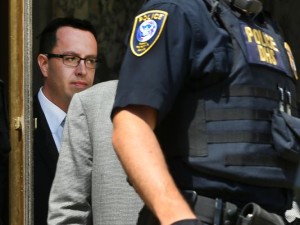About two weeks ago, Jared Fogle, famous for his Subway sandwich diet, was indicted for two serious federal sex crimes: 1) receiving and distributing child pornography and 2) traveling to engage in illicit sexual contact with a minor. (Fogle has since pleaded guilty to both offenses).

Recently, public debate questioned, ”why wasn’t Fogle charged with rape?” But why not sex trafficking? The indictment alleges facts that would amount to sex trafficking under federal law, such as allegations that Fogle paid for sex acts with a minor in the Plaza Hotel and in the Ritz Carlton Hotel in New York City. The indictment also reports that Fogle offered to pay for sex with other minors and asked to be put in contact with other youth saying, “the younger the girl, the better.”
In May 2015 the Justice for Victims of Trafficking Act (JVTA) was enacted and clarifies that the federal crime of sex trafficking includes buyer conduct by adding “patronizes” and “solicits” as prohibited conduct. Importantly, force, fraud or coercion does not have to be proven when a minor is “caused to engage in a commercial sex act” to be sex trafficking. In fact, buyers commit sex trafficking offenses regardless of whether there is a third party or trafficker involved, as discussed in Shared Hope’s recent policy paper, Eliminating the Third Party Control Barrier to Identifying Juvenile Sex Trafficking Victims.
But what about New York’s ability to respond to this type of behavior and protect minors? The lack of appropriate state-level offenses is a glaring issue here. First, New York is an outlier as one of only 4 states that requires that force, fraud or coercion be used to identify a child who is bought or sold for sex as a victim of sex trafficking. Second, New York’s sex trafficking law does not apply to buyers, but only someone who “intentionally advances or profits from prostitution.” (Profiting from prostitution is defined to specifically exclude patrons.) Third, New York’s CSEC (Commercial Sexual Exploitation of Children) offenses only protect victims under 14. The criminal offense of “Patronizing a prostitute” in New York would apply to buyers of older minors – the same way it applies to adults who are patronized –in the third degree, which is a Class A misdemeanor with a possible sentence of up to 1 year imprisonment and a possible fine not to exceed $1,000. So, in essence when wealthy buyers travel to NYC and exploit minors for sex, it is potentially a low level offense under New York state law. Although “patronizing a prostitute” in the first and second degree apply when minors under the age of 11 and 14, respectively, are exploited, this simply exacerbates unfair, damaging stigmas that minors of any age who are sexually commercially exploited are considered “prostitutes.”
Regarding our cultural understanding and the language used to refer to the sex trafficking or commercial sexual exploitation of children, the public debate and sensitivity is rightfully attuned. The exchange of money does not sanitize predatory behavior or the resulting victimization and underlying exploitation of minors’ vulnerabilities. Laws must be enacted and enforced, on both the federal and state level that apply to buyers with penalties that reflect the seriousness of these crimes.
 Rep. Judge Ted Poe and Senator John Cornyn cross-filed the End Sex Trafficking Act of 2013 on July 24, 2013. The bill has the purpose of clarifying the federal Trafficking Victims Protection Act (TVPA) and its criminal provision, 18 USC 1591, to include actions by buyers – through the verbs “patronizes or solicits” – as offenses of sex trafficking.
Rep. Judge Ted Poe and Senator John Cornyn cross-filed the End Sex Trafficking Act of 2013 on July 24, 2013. The bill has the purpose of clarifying the federal Trafficking Victims Protection Act (TVPA) and its criminal provision, 18 USC 1591, to include actions by buyers – through the verbs “patronizes or solicits” – as offenses of sex trafficking.





